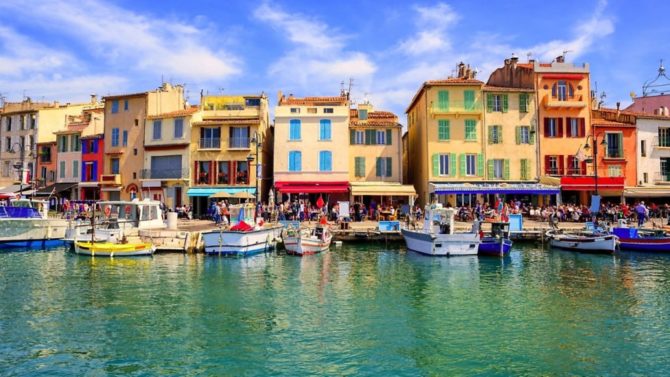France added to amber list of travel destinations

The UK government has announced its traffic light system for travel this summer including which countries are classified as green, amber and red – what does it mean and what are the requirements if you want to travel to and from France?

International leisure travel from England will no longer be illegal from 17 May but strict border control measures will remain in place, the government has confirmed.
It has added 12 countries and territories to its ‘green list’ including Portugal, Australia, New Zealand, Iceland and Gibraltar allowing people to go on foreign holidays without having to quarantine on their return.
However, most of Europe has been placed in the ‘amber’ category, including France, Spain, Germany, Belgium and Austria. So what exactly does that mean for those looking to visit France this summer?
Can I travel to France when it is on the amber list?
The government is advising you should not travel to amber list countries or territories for leisure purposes. The Foreign, Commonwealth and Development Office continues to advise against all but essential travel to the whole of France based on COVID-19 risks. The French Government also strongly advises limiting international travel at present.
However, it is still permitted for work – some people are exempt from the requirements depending on their job. If you regularly work in France, you need to complete a declaration form for overseas travel. You do not need to take a COVID-19 test before you travel back to the UK, but you do need to complete a passenger locator form and book tests to take after you arrive in England. In extremely limited circumstances you may also be able to be exempt on compassionate grounds. Under UK law, British nationals are also permitted to travel abroad if it’s to carry out activities related to buying, selling, letting or renting a residential property.
When will the amber status be reviewed?
Countries can be moved between lists if conditions change and you can sign up for email alerts to be notified of any changes. The lists will be reviewed every three weeks, informed by public health advice and the latest data.
What if I am already in France and want to travel back to the UK?
If you have been in an amber country in the 10 days before you arrive in England you must complete a passenger locator form online. You can submit the form any time in the 48 hours before you arrive in the UK. You must also take a COVID-19 test and have proof of a negative COVID-19 test.
When you arrive you must quarantine at home or in the place you are staying for 10 days, take a COVID-19 test on or before ‘day two’ and on or after ‘day eight’. You may be able to end quarantine early if you pay for a private COVID-19 test.
What are the entry requirements when I arrive in France?
France has already reopened its borders to travellers from across the EU. Arrivals from the UK are also permitted and do not need to justify an essential reason to enter. You will need to complete a ‘sworn statement’ (déclaration sur l’honneur) form self-certifying you are not suffering from symptoms associated with coronavirus and have not been in contact with confirmed cases in the preceding fortnight.
All travellers, including those aged 11 and above, will need to present a negative PCR COVID-19 test result, carried out less than 72 hours before departure. The UK government states you should not use the NHS testing service to get a test to facilitate travel to another country but arrange to get a private test from a private coronavirus testing provider. Private tests start from around £120 but airports and travel companies are starting to offer cheaper tests to customers.
On arrival in France, you are required to self-isolate for seven days and take another PCR test at the end of the isolation period. According to its four-stage plan, France is hoping to open to global tourists from 9 June and is expected to announce its own traffic light system. It has already suggested PCR tests will be free for tourists visiting this summer.
Are the rules different if I have had both COVID-19 vaccinations?
No, those who have been vaccinated remain subject to the same rules, although whether you’ll need to show proof of vaccination in the future depends on individual countries and what agreements are put in place. If needed, people in England who have had both vaccine doses will be able to demonstrate their COVID vaccination status via the NHS app from 17 May. Those without access to the app can request a letter from the NHS proving their vaccination status by calling 119. Meanwhile France has launched its own COVID health pass to allow travel to and from its overseas territories. It has also discussed a ‘special pass’ for US citizens who have been vaccinated, which could be part of a digital Green Certificate which has been proposed by the European Commission to facilitate the safe, free movement of citizens within the EU.
What are the COVID-19 restrictions in France at the moment?
A national curfew is in place from 9pm to 6am. Since 19 May, cafés, bars and restaurants have been able to offer outdoor dining and non-essential businesses have been allowed to open, along with museums, theatres, cinemas and sports facilities. Shops selling essential goods, as well as book and record stores, florists and hairdressers have remained open. You must wear a mask at all venues. Outdoor gatherings of more than six people are not permitted. If you do not follow lockdown rules you could be fined €135. From 3 May, internal travel restrictions in France were lifted. During your stay, the French Government advises downloading and activating the TousAntiCovid app.
What happens if France is moved to the red list?
If you are a British or Irish national and have passed through a ‘red list’ country, in addition to completing a passenger locator form and taking a COVID-19 test you will also have to book a place in a quarantine hotel for 10 full days. You must also take a COVID-19 test on or before ‘day two’ and on or after ‘day eight’. If you break the quarantine rules, you may face a penalty of up to £10,000.
For more information, visit gov.uk
_____________________________________________________________________________________________________________________________________________________________________________________________________________________________________________________
You might also like
Covid restrictions: can I visit my second home in France?
Coronavirus: what is the current situation in France?
___________________________________________________________________________________________________________________________________________________________________________________________________________________________________________________
Share to: Facebook Twitter LinkedIn Email


